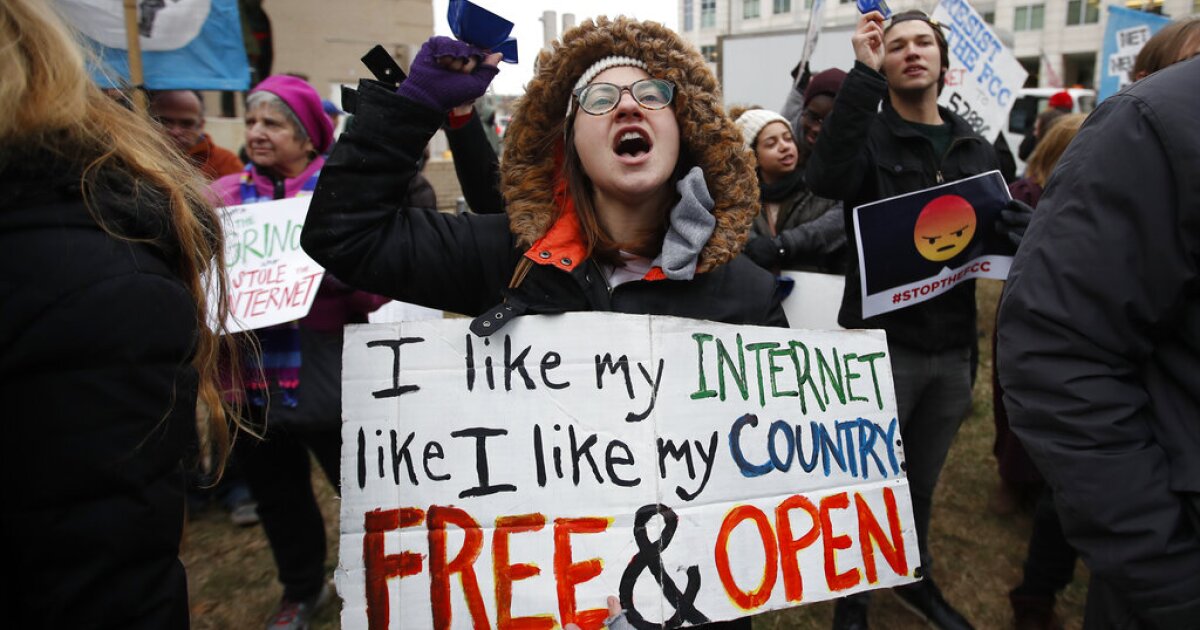

The Federal Communications Commission moved this past week to reinstate “net neutrality,” a legal principle requiring that internet service providers treat all data equally and not discriminate based on their source or destination.
Net neutrality has long been a goal of the Biden administration and liberal activists. Here is what to know about the push:
UAW STRIKE: FOUR-DAY WORKWEEK FAVORED BY UNION GAINING IN POPULARITY
WHY IT’S HAPPENING NOW
The simple reason the commission is moving on net neutrality now, more than two years into President Joe Biden’s tenure, is that Biden was finally successful earlier this month in gaining Senate confirmation for a fifth commissioner, Anna Gomez.
With Gomez, the commission now has a majority under Chairwoman Jessica Rosenworcel that favors reinstating net neutrality. That would involve classifying broadband internet as a “common carrier” under Title II of the Communications Act of 1984, meaning that internet service providers would be treated as telecom providers rather than information providers. This change in definition means that broadband providers are subject to additional rules, such as regulations preventing them from limiting access to specific websites or charging different rates for traffic to different sites.
“Political realities affect everything,” Stephanie Joyce, Computer and Communications Industry Association senior vice president, told the Washington Examiner. “And without the fifth commissioner, it would have been a waste of time to take comment on an order that would have resulted in a two-two tie.”
Other than the new majority, though, there is not some new development or problem that led the commission to act.
The nightmare possibilities that many Democrats and net neutrality advocates warned of in 2017 when Obama-era neutrality rules were reversed by Trump-appointed FCC Chairman Ajit Pai, did not come to pass, and the fears of certain sites or platforms being throttled or being charged extra did not materialize.
Indeed, in her speech outlining the need for new net neutrality rules, Rosenworcel ruled out the possibility that they could involve regulation of rates charged by internet providers.
“They say this is a stalking horse for rate regulation. Nope. No how, no way. We know competition is the best way to bring down rates for consumers,” she said.
“[Rosenworcel] is making good on a long-standing promise and expectation of this administration, starting with President Biden and his infrastructure executive order to reinstate net neutrality rules,” Tom Johnson, former general counsel for the FCC, told the Washington Examiner. “She wasted no time doing that two days after [Gomez] was confirmed. But I think a big question unanswered in her remarks was, why this is necessary at this point.”
ROSENWORCEL’S CASE FOR NET NEUTRALITY
Rosenworcel laid out a few different justifications for net neutrality rules in her Tuesday announcement.
One is to set a national standard in order to avoid a patchwork of state-level rules to make compliance easier for providers. At least seven states responded to Pai’s reversal of Title II by incorporating net neutrality on a state level — a development that Rosenworcel credited for the fact that the repeal of the 2015 rules didn’t cause havoc.
“We are not choosing between net neutrality rules and no rules,” Rosenworcel argued. “We are discussing one national standard or a patchwork of state regulations.”
Another is that reclassifying the internet as a Title II service would allow the commission to take additional action against internet service providers that failed to provide for their communities. Rosenworcel noted, as an example of the need for greater regulatory powers, a moment in 2020 in which a neighborhood in Detroit lost internet for 45 days in the middle of the pandemic, and its internet service provider suffered few consequences.
A third is that the FCC needs additional authority over internet service providers for the purposes of national security, cybersecurity, and privacy. For example, the commission said in the proposed rule that internet service providers collect a significant amount of data about customers that the companies may not adequately protect, necessitating regulations. As another example, it raised the possibility that regulation might be needed to ensure that foreign actors do not gain undue influence over the physical infrastructure of the internet.
CRITICS RESPOND
Net neutrality critics dismissed one of Rosenworcel’s lines of argument — that COVID-19 illustrated the extent to which people rely on the internet and showed the need for net neutrality. Rosenworcel’s arguments “are not new, and the fact that more Americans are using broadband today won’t be enough, in and of itself, to support a re-imposition of Title II regulation,” Diana Holland, former deputy chief at the FCC’s Wireline Competition Bureau, told the Washington Examiner.
Rosenworcel noted only one instance of an internet service provider throttling customers since the rule’s reversal in 2017, in which Verizon cut off data access to a California fire department mid-wildfire fighting. However, the example would not have been considered illegal under the Obama-era rules because it resulted from established data restrictions on the fire department’s data package.
Critics said that they have not seen significant evidence to prove that the FCC’s current “regulation lite” approach isn’t working. “I don’t know of any complaints that broadband internet service is broken and needs to be fixed, which suggests that things are working just fine without having these rules in place,” Holland said.
The rules are also expected to be bad for smaller ISPs. Many smaller internet providers in rural and isolated areas don’t “want to deal with the increased regulatory and legal costs associated with that sort of burdensome regulation,” Johnson said.
CLICK HERE TO READ MORE FROM THE WASHINGTON EXAMINER
The proposed rulemaking is currently available for public comment and is expected to take several months before it is voted on and finalized.
The reclassification of internet service providers to Title II also faces the risk of the Supreme Court blocking the ruling based on EPA v. West Virginia, according to a white paper by two former Obama solicitor generals.





